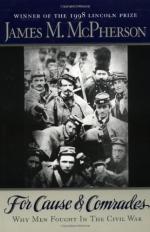
|
| Name: _________________________ | Period: ___________________ |
This quiz consists of 5 multiple choice and 5 short answer questions through Chapter 6, A Band of Brothers.
Multiple Choice Questions
1. During his visit to the four Civil War battlefields near Fredericksburg, McPherson thinks about the fighting that happened on May 12, 1864; for how many hours did the battle last?
(a) 4.
(b) 18.
(c) 27.
(d) 9.
2. As McPherson discusses religion's role in the Civil War, he notes that a lieutenant from New Jersey who fought in the conflict was what religion?
(a) Mormon.
(b) Jewish.
(c) Quaker.
(d) Atheist.
3. As the excitement for battle raced across the country, the governor of Ohio said he could not send the requested thirteen regiments but would send how many?
(a) 16.
(b) 5.
(c) 8.
(d) 20.
4. When McPherson and his cousin visit the four Civil War battlefields near Fredericksburg, Virginia, he notes that it is the day after which of the following holidays?
(a) Thanksgiving.
(b) Labor Day.
(c) Christmas.
(d) Easter.
5. In "Chapter 6: A Band of Brothers," McPherson states that in the Confederacy, which state endured a great deal of disdain from other states?
(a) Arkansas.
(b) Virginia.
(c) Texas.
(d) North Carolina.
Short Answer Questions
1. By 1863, McPherson states, trouble and sorrow in the dis-United States was almost beyond calculation, as the war had claimed how many lives?
2. As the book opens, McPherson says that he took some Princeton students to Gettysburg in the spring of what year?
3. When discussing Jesse Beecher's service record, McPherson states that he fought in all BUT WHICH of the following states?
4. Which of the following was a major in the 19th Iowa, described in "Chapter 4: If I Flinched I Was Ruined," who would walk and let injured men ride his horse?
5. While talking about good-luck charms, McPherson notes there were few _____________ in the Civil War.
|
This section contains 272 words (approx. 1 page at 300 words per page) |

|




